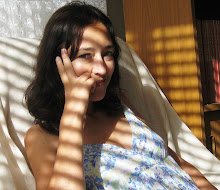Some of my readers come here looking for advice on alleviating PMS symptoms after childbirth.
It's true that some women find that there's an increase in pre-menstrual symptoms or their severity after having a baby. But it's hard to find out exactly why, apart from the obvious, that is, fluctuations in hormone levels.
I tried to find an answer after noticing it myself after the birth of my third child.
PMS itself is hard to define, since there are a variety of symptoms including fluid retention, headaches, breast tenderness, and irritability, and symptoms vary from woman to woman.
Aparently there is a link between women experiencing PMS symptoms and cravings for foods which are high in fat and sugar. So it's worth aiming for a healthier diet and attention to eating regularly as one way to go in easing symptoms.
A woman's fertility cycle can change after childbirth, for example, cycles may become longer or shorter in duration than before pregnancy, so it follows that can be differences in PMS symptoms and their intensity as well.
Becoming a new mother, or a mother again, can also impact your general health if you aren't diligent about meeting your nutritional, exercise and emotional needs.
Many of us are brilliant at looking after our children's health, and completely ignoring our own. Might a worsening of PMS symptoms be an indicator that you are run down generally?
Here are some tips from the Better Health channel, a Victorian government website, which I found useful:
- Exercise regularly, at least three times a week – try to exercise daily in the premenstrual period
- Don’t smoke
- Cut back on caffeine and alcohol in the two weeks before menstruation
- Ensure that you get enough sleep
- Manage your stress in whatever way works for you – for example counselling, Tai Chi or meditation, walking or gardening
Vitamin, mineral and herbal supplements such as calcium, magnesium, vitamin E and even St John's Wort have all been suggested as potentially effective treatments, as well as acupuncture, naturopathy and relaxation therapy.
There are also hormone treatments and medications available if PMS is really impacting your life.
For more information, see the Better Health article:
www.betterhealth.vic.gov.au/bhcv2/bhcarticles.nsf/pages/premenstrual_syndrome_treatment_options
There's another article with a similar gist at Parenting.com



No comments:
Post a Comment